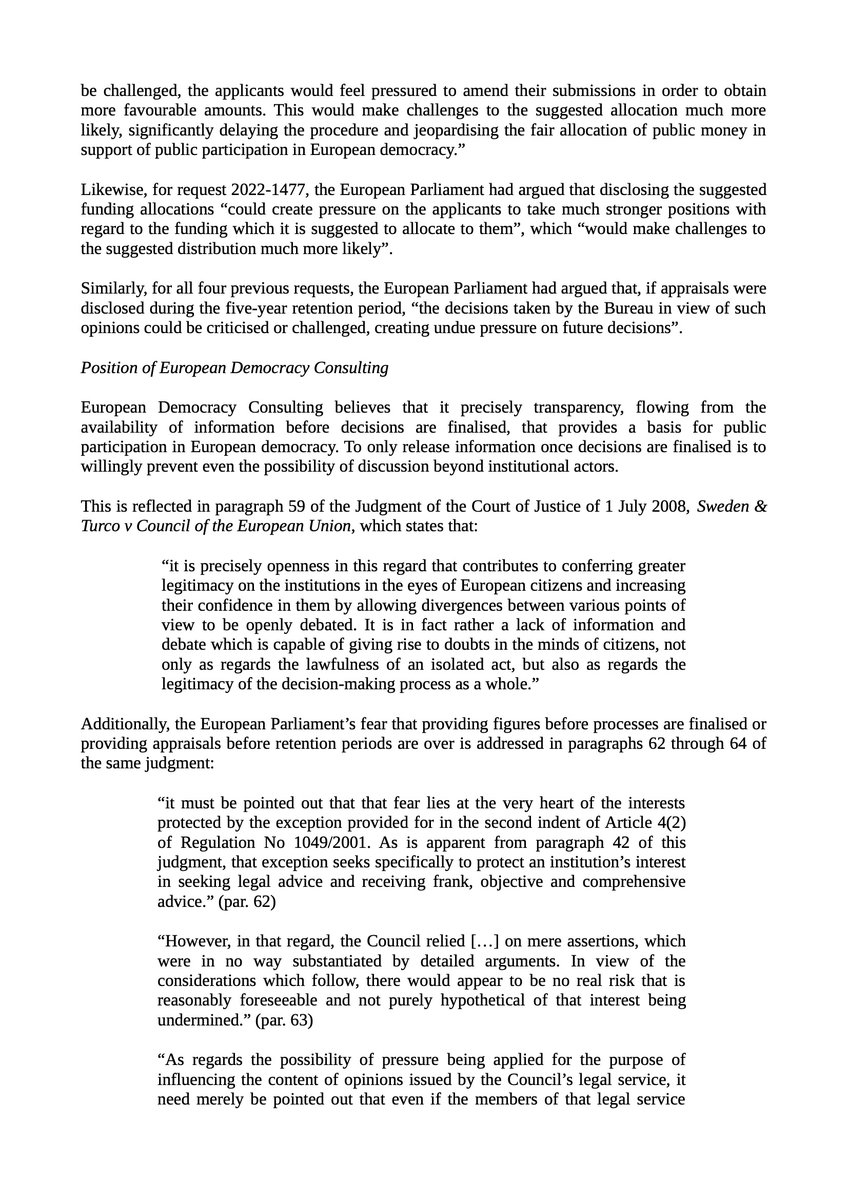A victory for #transparency!! 💪🇪🇺
@EDC_eudemocracy paved for the way for information on #europeanparties to be available from the @Europarl_EN to citizens without delay!
Before, information took up to 8 years to be available in full.
@edecapitani @wouter_wolfs @POLITICOEurope
@EDC_eudemocracy paved for the way for information on #europeanparties to be available from the @Europarl_EN to citizens without delay!
Before, information took up to 8 years to be available in full.
@edecapitani @wouter_wolfs @POLITICOEurope

Over the past several years, @EDC_eudemocracy has made many, many requests to the European Parliament to access decisions by its Bureau on the funding of #europeanparties. These included decisions for funding (for the coming year) and final accounts (which wrap up the process).
Invariably, these documents were provided with heavy redactions over the parts covering the EP's reasoning for its decisions: we could see the outcome (amounts), but not how decisions were made. Until yesterday, the latest full document related to funding for 2015 -- 8 years ago.
In April, @EDC_eudemocracy challenged the @Europarl_EN's decisions to redact these documents, arguing that its arguments were not in line with Regulation 1049/2001 on public to documents (notably, provisions under Article 4) 👇
eur-lex.europa.eu/eli/reg/2001/1…
@EvinIncir @miapetrakumpula
eur-lex.europa.eu/eli/reg/2001/1…
@EvinIncir @miapetrakumpula
Here are the first four pages of @EDC_eudemocracy's "confirmatory application", challenging the EP's arguments.
Here is the link the entire file: eudemocracy.eu/wp-content/upl…



Here is the link the entire file: eudemocracy.eu/wp-content/upl…




And here are the next (and last) three pages of @EDC_eudemocracy's confirmatory application.
Here is the link the entire file: eudemocracy.eu/wp-content/upl…


Here is the link the entire file: eudemocracy.eu/wp-content/upl…



Additionally, @EDC_eudemocracy argued that the EP's use of the ECJ judgment "Sweden & Turco v Council of the European Union" (2008) was self-serving and partial; it omitted important elements running directly against its arguments. 👇
eur-lex.europa.eu/legal-content/…
@EUCourtPress
eur-lex.europa.eu/legal-content/…
@EUCourtPress
Finally, @EDC_eudemocracy claimed that, even if the EP's arguments were indeed receivable, there was an overriding public interest in the publication of documents relating to the funding of #europeanparties, given their role in #eudemocracy and their heavy funding by EU citizens.
In its long-delayed reply, the EP denied our (admittedly long-shot) attempt to extend our challenge to previously requested documents on #europeanparties. This means the reply focused on a single document -- although its reasoning should apply equally to all similar documents. 



The @Europarl_EN also side-stepped all our legal arguments challenging their reasoning. Instead, it merely agreed that citizens indeed had "a clear interest in being informed on the allocation of [public funding]" to #europeanparties and foundations. 🔥🔥🔥
Along with its reply, the @Europarl_EN provided its note on the 2021 final reports of #europeanparties in full. No redactions, no delays, no backsies. 🔥🔥🔥
Since it took close to nine weeks to provide a two-page documents, which is long in duration (even by the EP's standards) and short in length (especially by the EP's standards...), it feels like the EP's reply does not reflect the entirety of the discussions that took place.
Also, by side-stepping the legal arguments, the EP gives the impression that it wishes to avoid acknowledging that the arguments it has long relied on would not hold in Court. A way to avoid shooting itself in the foot for future requests on similar but different topics.
As a result: 1/ the EP's reply only applies to documents regarding #europeanparties, 2/ although only for one document, the letter should apply to all related documents, and 3/ these documents should now be available to citizens in full without delay (but upon request, grrr).
Our next step is a new request for all the documents on #europeanparties previously received with redactions (for the years 2015-2023), using the EP's confirmation of a "clear interest" as basis for the provision of the these documents in full.
If confirmed, this decision is a clear win for EU citizens and #transparency. Citizens pay for #europeanparties with their money, and these parties seek to represent them. We ought to know how they are funded. Party funding transparency is essential for democracy. 🔥🔥🔥
@EDC_eudemocracy is committed to strengthening #eudemocracy and transparency, especially with regards to European political parties. Stay tuned for our upcoming observatory of the funding of #europeanparties! 🇪🇺
Finally, I want to underline that @EDC_eudemocracy's decision to challenge the EP's arguments, which we had come to take for granted, was inspired by @edecapitani who took the @EUCouncil to the ECJ. Institutions tend to oppose transparency, but we can act and force their hand. 💪 

Reporting of these cases in the press (here by @POLITICOEurope via @HankeVela) can have a snowball effect and a real impact. We encourage the media to report on such developments, as well as on #europeanparties and their funding. We look forward to putting data at their disposal. 

Update: following the @Europarl_EN's reply and recognition of an overriding interest for citizens in the funding of #europeanparties, another 13 documents from the Bureau of the EP were already requested! 💪🇪🇺
Update: in a confirmation of the change in the EP's practice with regards to the publication of information on #europeanparties, we have just received the 2023 funding decision fully unredacted! 💪🇪🇺 Latest such document previously received was dated December 2014!
@threadreaderapp unroll please
• • •
Missing some Tweet in this thread? You can try to
force a refresh

 Read on Twitter
Read on Twitter







